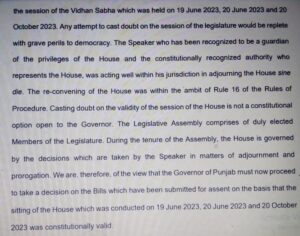The News Freedom
New Delhi, November 23
The Supreme has Court held that the Governor, as an unelected head of the state, is entrusted with certain constitutional powers. However, this power cannot be used to thwart the normal course of lawmaking by the state legislatures. “Consequently, if the Governor decides to withhold assent under the substantive part of Article 200, the logical course of action is to pursue the course indicated in the first proviso of remitting the Bill to the state legislature for reconsideration, the Supreme Court bench headed by Chief Justice, Dr Dhananjaya Y Chandrachud, said.
Acting on a petition filed by the Punjab government, the Supreme Court further said that we are of the view that there is no valid constitutional basis to cast doubt on the validity of the session of the Punjab Vidhan Sabha which was held on 19 June 2023, 20 June 2023 and 20 October 2023.

“Any attempt to cast doubt on the session of the legislature would be replete with grave perils to democracy. The Speaker who has been recognised to be a guardian of the privileges of the House and the constitutionally recognized authority who represents the House was acting well within his jurisdiction in adjourning the House sine die,” the Supreme Court said.
The Supreme Court in its order passed on November 10 and available on Thursday, further said that the re-convening of the House was within the ambit of Rule 16 of the Rules of Procedure. Casting doubt on the validity of the session of the House is not a constitutional option open to the Governor. The Legislative Assembly comprises of duly elected members of the legislature.
“ During the tenure of the Assembly, the House is governed by the decisions which are taken by the Speaker in matters of adjournment and prorogation. We are, therefore, of the view that the Governor of Punjab must now proceed to take a decision on the Bills which have been submitted for assent on the basis that the sitting of the House which was conducted on 19 June 2023, 20 June 2023 and 20 October 2023 was constitutionally valid,” the Supreme Court further said.
The Supreme Court said that we clarify that we have not expressed any opinion in regard to the manner in which the Governor will exercise his jurisdiction on the Bills in question presented to him. However, he must act in a manner consistent with the provisions of Article 200 of the Constitution.
